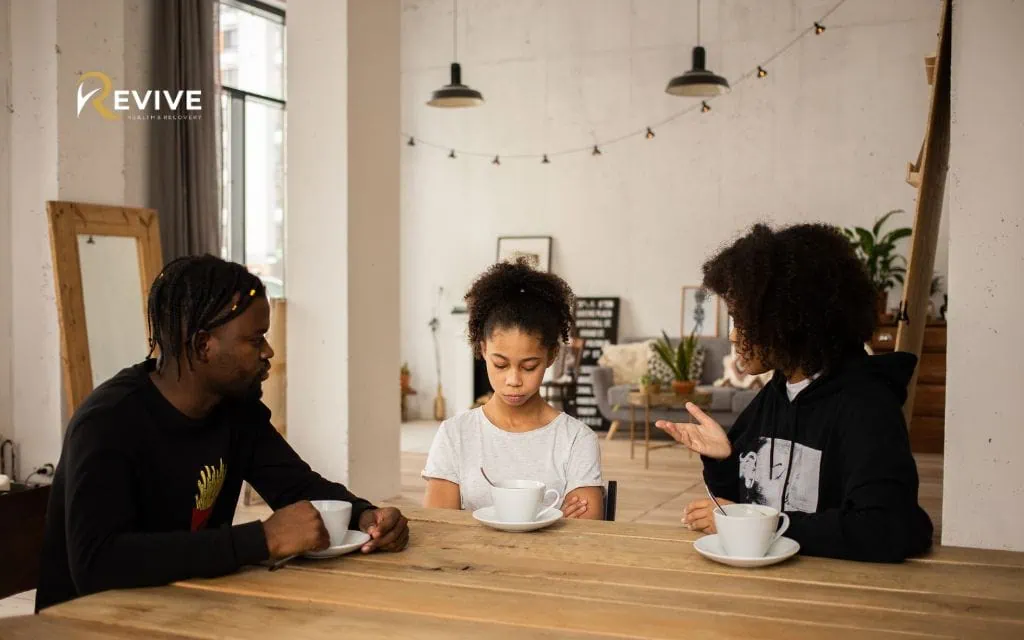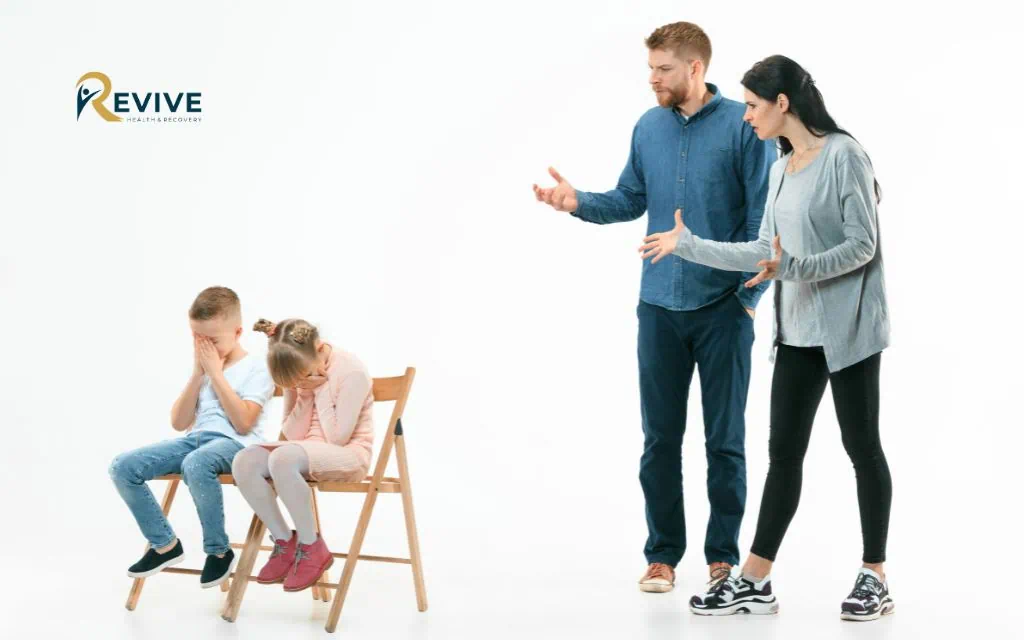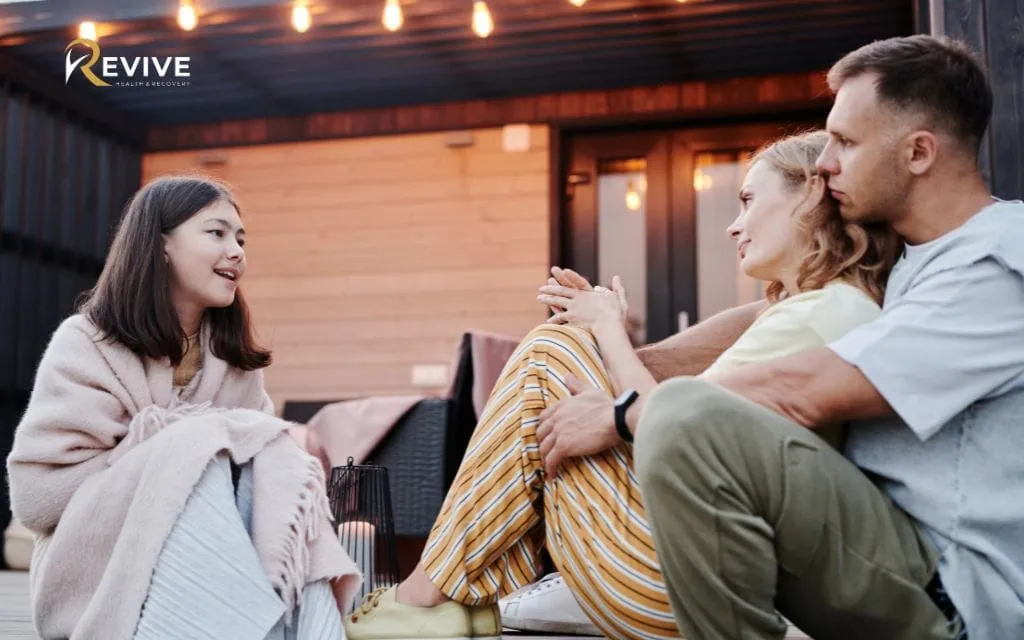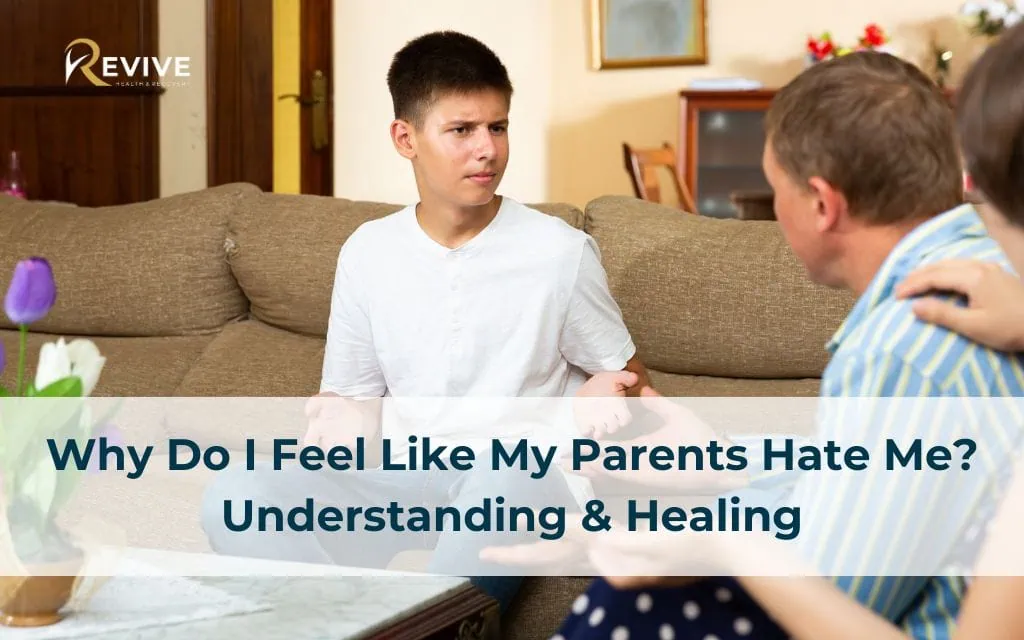Do you constantly ask yourself, “Why do I feel like my parents hate me?” This devastating question haunts millions of individuals, creating emotional wounds that ripple through every relationship and life decision. At Revive Health Recovery, we understand that wondering “why do I feel like my parents hate me” represents more than simple family disagreements. These feelings often signal deeper psychological patterns that deserve professional attention and compassionate care.
Research shows that perceived parental rejection activates the same brain regions as physical pain, making the question “why do I feel like my parents hate me” a genuinely traumatic experience. Whether you’re dealing with depression from family problems, childhood emotional invalidation, or complex family dynamics, you’re not alone in wrestling with these painful emotions.
Understanding Why You Might Feel This Way
When you find yourself thinking “why do I feel like my parents hate me,” understanding the psychological roots of these feelings becomes essential for healing. Many people experience these emotions without realizing the complex factors that contribute to perceived parental rejection.
The Psychology Behind Perceived Parental Rejection
Your feelings about parental rejection stem from fundamental psychological frameworks that shape human relationships. Attachment Theory explains how early childhood experiences create internal working models of relationships that persist into adulthood. When these foundational connections feel unstable, your brain interprets parental behavior through a lens of potential rejection, making you wonder “why do I feel like my parents hate me” even during neutral interactions.
Parental Acceptance-Rejection Theory demonstrates that children who experience emotional neglect develop specific behavioral and emotional patterns. These patterns don’t simply disappear when you reach adulthood, they continue influencing how you interpret family interactions and perceive love.
How childhood experiences shape adult perceptions becomes clearer when we understand that your developing brain categorized parental responses as either safe or threatening. If you frequently felt dismissed, criticized, or emotionally unsupported, your nervous system learned to expect rejection, leading to persistent thoughts of “why do I feel like my parents hate me.”
Common Triggers and Scenarios
Communication style differences often create the foundation for feeling unloved by family. Parents who express care through actions rather than words may leave you feeling emotionally starved, especially if you need verbal affirmation to feel valued.
Generational gaps and value conflicts intensify these feelings. Your parents’ upbringing likely differed significantly from your experiences, creating different expectations about emotional expression, communication, and family relationships. What feels like rejection might actually represent cultural or generational misunderstanding.
Sibling dynamics and perceived favoritism trigger deep insecurities about your worth within the family system. When you feel like your parents hate you but love your siblings, these comparisons activate childhood fears about being replaced or found lacking.
Stress and mental health impacts on family relationships create cycles where depression makes you more sensitive to perceived rejection, while family tension worsens mental health symptoms. This pattern can make you feel trapped in negative family dynamics.

The Real Reasons Behind These Feelings
Understanding why you constantly think “why do I feel like my parents hate me” requires examining both external family dynamics and internal mental health factors. Often, the answer involves a complex interaction between genuine family communication issues and your own psychological state.
Emotional Neglect vs. Intentional Rejection
Defining emotional neglect helps distinguish between parents who deliberately withdraw love and those who struggle to express affection effectively. Emotional neglect often occurs when parents focus on providing physical needs while missing emotional ones. They may love you deeply but lack skills for emotional connection in this situation.
When parents struggle with their own mental health, their capacity for emotional availability diminishes. Depression, anxiety, or unresolved trauma can make parents seem distant or critical, even when they care deeply about your wellbeing. This creates situations where you wonder “why do I feel like my parents hate me” when they’re actually struggling with their own emotional challenges.
Cultural and family communication patterns significantly influence how love gets expressed and received. Some families express care through criticism intended to motivate improvement, while others show love through practical support rather than emotional warmth.
Your Mental Health’s Role
How depression affects perception cannot be understated, It literally changes how your brain processes social information. When you’re experiencing depression symptoms, neutral interactions feel negative, and mildly critical comments feel devastating, intensifying thoughts of “why do I feel like my parents hate me.”
Anxiety’s impact on family relationships creates hypervigilance to potential rejection signals. Your anxious brain scans for signs of disapproval, often finding threats where none exist and magnifying minor conflicts into major rejections.
The cycle of negative thinking patterns reinforces these perceptions. When you believe your parents hate you, you interpret their behavior through this lens, creating self-fulfilling prophecies where you withdraw or act defensively, prompting reactions that seem to confirm your fears.
Signs Your Feelings May Reflect Real Issues
While asking “why do I feel like my parents hate me” sometimes reflects mental health challenges, certain family patterns indicate genuine relationship problems that require attention. Recognizing these signs helps determine whether your feelings reflect reality or perception distortions.
Recognizing Emotional Invalidation
Patterns of dismissive behavior include consistently minimizing your emotions, changing subjects when you express feelings, or responding to your concerns with criticism or lectures rather than empathy. These behaviors validate your question “why do I feel like my parents hate me” because they demonstrate lack of emotional attunement.
Lack of emotional support becomes evident when parents fail to comfort you during difficult times, dismiss your achievements, or seem more concerned about appearances than your actual wellbeing.
Conditional love and approval create environments where you feel valued only when meeting specific expectations. This pattern leaves you constantly anxious about losing parental approval and questioning your inherent worth.
When Professional Help Is Needed
Red flags in family relationships include persistent criticism, emotional manipulation, threats of abandonment, or patterns where you feel worse about yourself after family interactions.
Impact on your daily functioning signals serious concern when family relationships affect your work, friendships, or ability to form healthy romantic connections. If you find yourself constantly seeking approval or avoiding intimacy, family dynamics may require professional intervention.
Persistent feelings of worthlessness that don’t improve with time or positive experiences suggest deeper psychological wounds that benefit from specialized depression treatment Colorado residents can access through qualified mental health providers.

Healing Strategies and Coping Mechanisms
Learning to cope with the persistent question “why do I feel like my parents hate me” requires developing both practical communication skills and internal emotional regulation techniques. These strategies help whether your feelings reflect actual family dysfunction or perception distortions.
Communication Techniques
Setting healthy boundaries protects your emotional wellbeing while maintaining family connections. This means deciding what topics you’ll discuss, how much time you’ll spend together, and what behaviors you’ll accept during interactions.
Expressing needs effectively requires clear, specific communication about what you need from relationships. Instead of saying “you never support me,” try “I need encouragement when I’m struggling with work stress.”
Understanding different love languages helps recognize when parents express care in ways you don’t naturally receive. Some parents show love through acts of service or providing financial support rather than words of affirmation or physical affection. Recognizing these patterns can reduce instances where you wonder “why do I feel like my parents hate me.”
Building Self-Worth Independent of Parental Approval
Developing secure self-identity involves recognizing your inherent worth separate from family validation. This process requires identifying your values, strengths, and goals independent of parental expectations or approval.
Creating chosen family relationships with friends, mentors, or supportive community members provides emotional nourishment when biological family relationships remain challenging.
Self-compassion practices help break cycles of self-criticism that often develop in invalidating family environments. Learning to treat yourself with the kindness you’d show a good friend creates internal emotional safety.

Professional Treatment Options
When the question “why do I feel like my parents hate me” persists despite your best efforts at understanding and communication, professional intervention becomes essential. Mental health treatment addresses both individual healing and family relationship repair.
Individual Therapy Benefits
Cognitive Behavioral Therapy (CBT) for depression addresses the thought patterns that maintain feelings of parental rejection. CBT helps you identify and challenge negative assumptions about family relationships while developing healthier coping strategies.
Processing childhood experiences through therapy provides safe space to understand how early relationships shaped current perceptions. This work helps distinguish between past wounds and present realities.
Building emotional regulation skills enables you to manage intense feelings without being overwhelmed. These skills prove essential for improving family relationships and overall mental health.
Family Therapy Approaches
When family therapy is appropriate depends on your family’s willingness to participate and commitment to change. Family therapy Denver providers can help assess whether your family system is ready for this work.
What to expect in family sessions includes guided conversations about communication patterns, role definitions, and emotional needs. Therapists help family members understand different perspectives while teaching healthier interaction patterns.
Improving family communication patterns requires practice and patience. Parent-child relationship counseling provides structured opportunities to rebuild trust and understanding while addressing long-standing conflicts.
At Revive Health Recovery, our family liaison works throughout your entire treatment program, helping families stay informed and engaged at every step. We understand that strong family support significantly improves recovery outcomes for mental health treatment.
FAQs About Feeling Unloved by Parents
Is it normal to feel like your parents hate you?
Yes, these feelings are common, especially during times of stress or when experiencing depression. However, persistent feelings warrant professional evaluation. Revive Health Recovery specializes in helping individuals understand and address these complex family dynamics through evidence-based therapy approaches.
How do I know if my parents actually don’t love me or if it’s my depression talking?
Depression significantly affects how you interpret relationships, often making neutral interactions feel negative. Professional assessment can help distinguish between depression-distorted perceptions and actual relationship problems. Our therapists at Revive Health Recovery use specialized techniques to help you gain clarity about family relationships.
Can therapy really help improve my relationship with my parents?
Therapy provides tools for understanding family patterns, improving communication, and healing emotional wounds. Even when parents don’t participate, individual therapy can dramatically improve your experience of family relationships. Revive Health Recovery offers both individual and family therapy options tailored to your specific needs.
What if my parents refuse to participate in family therapy?
Individual therapy remains highly effective even without parental participation. You can learn boundary-setting skills, communication techniques, and emotional regulation strategies that improve family dynamics. Contact Revive Health Recovery to discuss how individual therapy can help your specific situation.
How long does it take to heal from feeling rejected by parents?
Healing timelines vary based on individual circumstances, but many people experience significant improvement within months of starting therapy. The key is finding the right therapeutic approach for your needs. Revive Health Recovery’s experienced therapists will work with you to develop a personalized treatment plan that addresses your unique situation.
5 Reasons Why Choose Revive Health Recovery Center
Specialized Depression Treatment: Our expert therapists understand how family relationships impact mental health and offer evidence-based treatments specifically for depression related to family dynamics. We use proven approaches including Cognitive Behavioral Therapy, Dialectical Behavior Therapy, and Trauma-Focused Cognitive Behavioral Therapy to address the complex intersection of depression and family relationships.
Culturally Sensitive Approach: We understand the diverse Colorado community and provide therapy that respects different cultural backgrounds and family structures. Our team recognizes that family dynamics vary across cultures, and we tailor our approach to honor your unique background while addressing mental health needs.
Comprehensive Care Model: From individual therapy to family counseling, we address both personal healing and relationship repair in a coordinated treatment approach. Our holistic method ensures that all aspects of your mental health and family relationships receive attention throughout your recovery journey.
Flexible Treatment Options: We offer both in-person and telehealth options to accommodate your lifestyle and comfort level, with evening and weekend appointments available. We understand that seeking help requires courage, and we make accessing our services as convenient as possible.
No Inpatient Requirement: As a healing center focused on outpatient care, we provide intensive therapy support while you maintain your daily routine and responsibilities. This approach allows you to practice new skills in your everyday environment while receiving professional support.
Take the First Step Toward Healing
If you constantly wonder “why do I feel like my parents hate me,” know that these painful emotions deserve professional attention and compassionate care. Whether these feelings stem from real family dysfunction, depression, or communication breakdowns, you don’t have to navigate this journey alone.
At Revive Health Recovery, our compassionate therapists specialize in depression treatment and family relationship issues, providing you with evidence-based tools and support needed to build healthier relationships and stronger self-worth. We understand that addressing the persistent question “why do I feel like my parents hate me” requires both individual healing and sometimes family-wide changes.
Our Denver facility offers comprehensive mental health services designed specifically for individuals struggling with family relationships and depression. Through individual counseling, group sessions, and family therapy when appropriate, we help you develop the skills and insights necessary for lasting emotional wellbeing.
Ready to start your healing journey? Contact Revive Health Recovery today:
Address: 1427 S Federal Blvd, Denver, CO 80219
Email: contact@revivehealthrecovery.com
Phone: (303) 268-4655 (Available 24/7)
Remember, seeking help demonstrates strength, not weakness. You deserve to feel loved, valued, and supported. Let us help you build the healthy relationships and emotional well-being you deserve. Our team is here to support you every step of the way toward healing and recovery.



